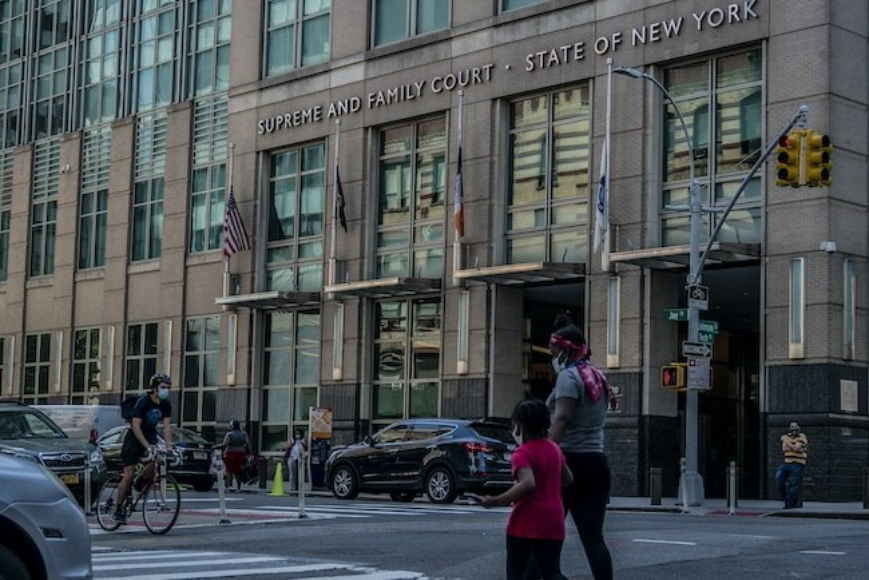It's the kids who suffer: staffing crisis threatens legal services for children in Family Court


by Cayla Bamberger
A staffing crisis of lawyers for New York City children is threatening legal services for young people who have been removed from their parents, orphaned by the pandemic or otherwise involved in Family Court matters.
Kids and teens may face delays and lower-quality representation in family legal disputes that nine sources familiar with the situation — including attorneys and staffers, a judge and a former client — attributed to increasingly hard-to-fill vacancies at nonprofit law offices and unworkable caseloads.
A revolving door of staffers is exacerbating the trauma children already experience in custody matters, allegations of neglect and abuse, and delinquency proceedings, sources said.
“It’s often the most traumatic events in their lives, and to have to meet new people and have those conversations again, it’s really detrimental,” said Maura McCarthy, senior staff attorney at the Children’s Law Center in Brooklyn, representing 2,200 clients so far this year. That’s already more children than it worked with all of last year.
Across the borough offices, a 35% attrition rate last year has affected staffers’ ability to build relationships with their clients and get the information they need to properly defend their interests.
Turnover is also affecting attorneys’ ability to effectively do their jobs, playing catchup on cases assigned midway through. “It becomes more of a triage mission, rather than us doing all the work we want to do,” McCarthy said.
The law offices, which disproportionately represent children from low-income households, rely on state aid to support operations. But they say that years of stagnant funding, worsened by recent budget cuts and increased caseloads, have led to a crisis in their field since the pandemic began.
“Without equitable state funding, the rights and protection of some of the most marginalized children in our state will suffer irreparably,” said Karen Freedman, president of Lawyers for Children.
Attorneys told the Daily News that they lack the time and resources to adequately prepare for hearings, and that they compensate for full days stuck in court by working nights. The hours, exacerbated by lower pay than their counterparts representing city agencies or parents, have led many employees to seek work elsewhere to support their own families or pay off student loans.
“The system is already strained,” said Rajiv Goswami, 23, who worked with the same Lawyers for Children attorney for five years. He said she provided stability while he navigated foster care. Goswami raised concerns for children who may have a different experience today.
The lawyers have caseloads capped at 150 children, compared with government lawyers who usually have 55 to 65 clients at a time, according to data from the law offices.
“There’s always some mistrust that it’s somebody who’s part of ‘the system,’ and we have to overcome that,” said Elizabeth Verillo, borough director of Queens and Staten Island at the Children’s Law Center. “Then when there’s a new person, that can make a child guarded again.”
Three full-time attorneys and their supervisor from the Queens office currently have a caseload of 664 children, Children’s Law Center data show. The workload and lack of staff can have a profound impact when children have their day in court.
Brooklyn Family Court Judge Erik Pitchal recently had to postpone a hearing at the last minute because the attorney had not been able to meet with her client.
“It’s like if you ever took an exam and you weren’t fully prepared, and you knew you weren’t prepared,” said Pitchal, president of the Family Court Judges Association. “That feeling of walking into something that’s big and important, and you’re about to wing it, that’s a terrible feeling. If it’s your own math test, that’s your choice — but it’s the life of your client.”
That child may have otherwise been able to go home to his parents, he told The News, if they had the chance to speak. It’s an occurrence that Pitchal said “comes up a lot” as lawyers run out of time to do the fact-finding necessary to make a robust case for what the child wants.
“When we think about kids and their measurement of time, we have to understand that delays in court are that much exaggerated in their opinion,” said Dawne Mitchell, chief attorney of the Juvenile Rights Practice at the Legal Aid Society.
“It’s really critically important that we don’t delay if there’s a way children can remain at home or return to home,” she added. “So to move these cases at the rate statute is designed to provide, we have to have staff.”
The law offices are making an eleventh-hour plea for $15 million in the state budget. Additional funds for lawyers who represent kids in child welfare and juvenile justice cases were shut out of the governor’s and the Legislature’s budgets, while increases were proposed for public defenders and other legal services lawyers.
The law offices’ ask breaks down to roughly $65 more invested in each child, according to their calculations, and will help make the offices competitive with government gigs that frequently offer better salaries for similar work.
“This funding is really to address the most vulnerable children,” said Mitchell. “We absolutely don’t want to miss this opportunity of providing them with the legal support they need that’s going to their safety, that they remain at home with families getting the support they need.”

